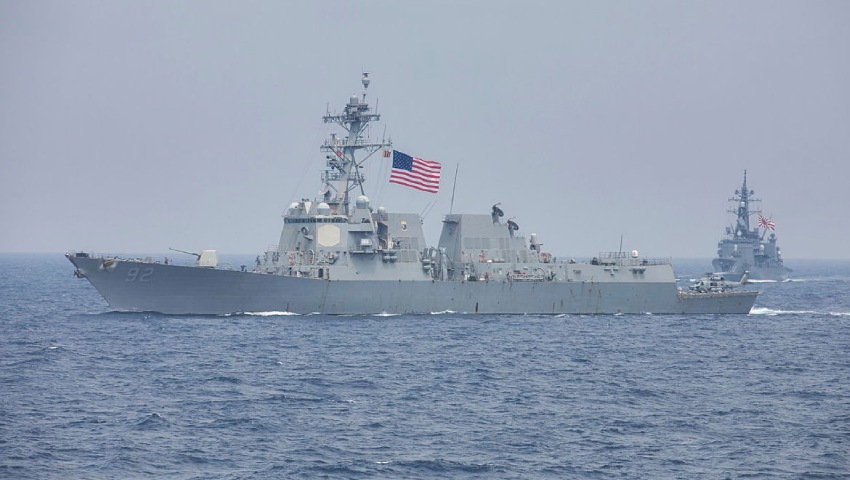Would tensions in the South China Sea abate if Washington ceases its long-held resistance to signing the UN Convention on the Law of the Sea?
The Chinese People’s Liberation Army (PLA) continues to flex its military muscle throughout the Indo-Pacific, with continued breaches of Taiwan’s air defence identification zone (ADIZ) of particular concern given Beijing’s open ambition to absorb the island.
To continue reading the rest of this article, please log in.
Create free account to get unlimited news articles and more!
The Chinese Communist Party’s (CCP) media mouthpiece, the Global Times, recently published a stern warning against any US military intervention in the Taiwan Strait.
“I would like to remind all parties that the Taiwan Straits are on the doorstep of the Chinese mainland,” the piece read.
“The US cannot match China’s ability to mobilise military forces in this region, as well as China’s will to fight.
“It would be a wise choice for the US military not to clash with the PLA here.”
The piece concluded by claiming “the two sides of the Taiwan Straits will eventually be unified”.
However, the PLA’s recent activity in the South China Sea has particularly alarmed the international community.
Most recently, a People’s Liberation Army Air Force (PLAAF) Shenyang J-16 strike fighter intercepted a Royal Australian Air Force (RAAF) P-8 Poseidon conducting “routine maritime surveillance activity” in international airspace over the South China Sea.
During the incident, which took place on 26 May, the fighter jet cut across the nose of the Australian surveillance platform, releasing a “bundle of chaff” ingested into the RAAF aircraft’s engine.
The manoeuvre was condemned by Prime Minister Anthony Albanese and Defence Minister Richard Marles, who stressed it would not deter the RAAF from conducting future missions over disputed territory.
On the same day, a Chinese aircraft confronted a Canadian military aircraft enforcing United Nations sanctions along the border with North Korea, failing to adhere to international air safety norms.
These incidents came just days after Chinese and Russian bombers flew over the Sea of Japan and East China Sea during the Quad leaders’ meeting in Tokyo.
Such incidents have fuelled debate over how Western powers, particularly the United States, can deter future acts of aggression.
Washington’s ratification of the UN Convention on the Law of the Sea (UNCLOS) has been touted as an option for the Biden administration.
UNCLOS, proposed in 1982, aims to establish “rules governing all uses of the oceans and their resources”.
Proponents claim ratifying UNCLOS would legitimise US condemnation of China’s breaches of maritime norms, while also protecting its own maritime freedoms.
But, Steven Groves, Margaret Thatcher Fellow at the Margaret Thatcher Center for Freedom, claims such a move would be redundant.
“[The] United States is the premiere naval force on the planet. To be sure, the United States adheres to UNCLOS’s myriad provisions regarding navigational freedoms and maritime boundaries,” he writes in a piece published by the Heritage Foundation.
“The United States also leads the world in curbing excessive claims made by other nations through its Freedom of Navigation Program.
“It's simply unnecessary for the United States to ratify UNCLOS to protect its maritime rights.”
Groves dismisses the “fact free” assertion US ratification of UNCLOS would help deter Chinese aggression.
“China—an UNCLOS member—has proven time and again that it has zero respect for the treaty,” he continues.
“In 2016, Beijing famously lost a major UNCLOS arbitration case to the Philippines regarding China’s chronic treaty violations in the South China Sea.
“Did China respect the arbitral tribunal’s decision and reform its behaviour? Of course not. Nor will it, regardless of US ratification.”
Groves goes on to note both US and Chinese membership of the International Convention on the Elimination of Racial Discrimination, adding this hasn’t prevented China from sending ethnic minority Uyghur citizens to “political education centres”.
“Likewise, China will not suddenly respect maritime law if the United States ratifies UNCLOS,” he adds.
Further, Groves claims ratifying UNCLOS would incur “significant costs” on the United States, exposing it to litigation.
“US membership in UNCLOS would expose the nation to international lawsuits, including specious suits attempting to fleece the United States for its alleged contributions to global climate change,” he writes.
“Environmental activists, law professors and even some nations have long explored suing the United States in an UNCLOS tribunal to advance the climate change agenda.”
Groves concludes by arguing UNCLOS membership would require the US to pay royalties from oil and gas production on its “extended continental shelf”.
“Ratification would amount to an open-ended commitment to forgo an incalculable amount of royalty revenue for no appreciable benefit,” he writes.
“No treaty known to man can guarantee America's rights and freedoms. UNCLOS is no exception.”
Get involved with the discussion and let us know your thoughts on Australia’s future role and position in the Indo-Pacific region and what you would like to see from Australia's political leaders in terms of partisan and bipartisan agenda setting in the comments section below, or get in touch with

 Login
Login







